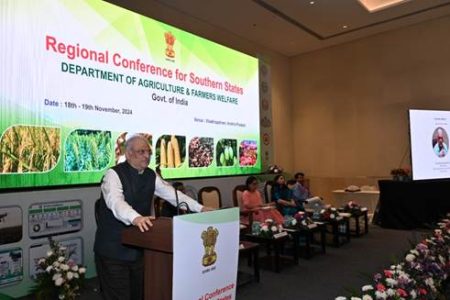Visakhapatnam: The Department of Agriculture and Farmers’ Welfare (DA&FW) conducted a regional conference on 18th and 19th November 2024 in Visakhapatnam to review the progress of various agricultural schemes implemented by Southern States and Union Territories. The conference brought together key officials, including Dr. Devesh Chaturvedi, Secretary, DA&FW, along with representatives from the states of Andhra Pradesh, Kerala, Tamil Nadu, Telangana, Karnataka, and the Union Territory of Puducherry. The event provided a platform to evaluate the implementation of agricultural initiatives and address regional challenges, emphasizing the government’s commitment to enhancing agricultural infrastructure and fostering growth in the sector.
The two-day conference was the second in a series of regional reviews organized by the Government of India to ensure equitable and sustainable agricultural development across the country. Dr. Devesh Chaturvedi highlighted the significant initiatives launched by the Ministry in recent years and encouraged the states to maximize the benefits of these schemes, particularly to support farmers and allied communities in their respective regions.
Dr. Chaturvedi stressed the importance of accelerating the execution of Centrally Sponsored Schemes (CSS) by ensuring timely fund allocation and addressing issues related to State contributions and Single Nodal Account (SNA) balances. He also emphasized the need for operationalizing SNA-SPARSH, returning unutilized balances, and promptly submitting Utilization Certificates (UCs). He urged the states to organize state-level conferences to address region-specific agricultural challenges and ensure focused attention to each state’s unique needs.
A key highlight of the meeting was the introduction of the newly launched Dharti Aaba Janajatiya Gram Utkarsh Abhiyan (DA-JGUA), approved by the Union Cabinet and launched by the Hon’ble Prime Minister in September 2024. The initiative aims to empower tribal communities by enhancing their recognition process and promoting their involvement in forest protection, conservation, and sustainable livelihoods. Dr. Chaturvedi urged the states to actively participate in the scheme to strengthen tribal communities and uplift the poorest sections of the population.
The conference also reviewed the implementation of major agricultural schemes, such as Pradhan Mantri Rashtriya Krishi Vikas Yojana (PM-RKVY) and Krishonnati Yojana (KY). States with lower performance in these schemes were urged to enhance their efforts in the remaining months of the fiscal year. Additionally, the states were advised to finalize their annual action plans for the 2025-26 fiscal year by December to ensure timely fund release and avoid delays in fund utilization.
A comprehensive review of other key initiatives followed, including the Pradhan Mantri Fasal Bima Yojana (PMFBY) for risk mitigation, the Digital Agriculture Mission to promote data-driven agriculture, and the integration of state land records with the Agristack for streamlined operations under PM KISAN. Dr. Chaturvedi called on the states to prioritize the creation of a farmers’ registry to take full advantage of both Central Sector and Centrally Sponsored Schemes.
High-priority topics discussed at the conference included the National Edible Oils Mission, NABL accreditation for laboratories, the Krishi Nivesh Portal, Carbon Credits, Namo Drone Didi, e-National Agriculture Market (e-NAM), Farmer Producer Organizations (FPOs), Soil Health Cards, and the Agricultural Infrastructure Fund (AIF). Additionally, a presentation on Natural Farming initiatives was made by Shri Vijay Kumar, Advisor to the Government of Andhra Pradesh, showcasing the state’s efforts to promote organic and sustainable farming practices.
The conference concluded with an Open House session, where stakeholders discussed various issues, including tenure farming, improved sampling systems, intercropping, seed quality, micro-irrigation, and organic farming practices. The session provided an opportunity to share insights on overcoming barriers in scheme implementation and maximizing their reach.
On the second day of the conference, the delegates visited Natural Farming fields and interacted with practitioners who have 2 to 8 years of field experience. They observed the preparation of various Jeevamruthams and the use of Agriculture Drone Spraying Technology, highlighting the adoption of innovative practices in sustainable farming.
This regional conference exemplified the government’s ongoing efforts to ensure that agricultural policies and programs effectively address the diverse needs of farmers across the country, with a focus on sustainability, inclusivity, and growth.

